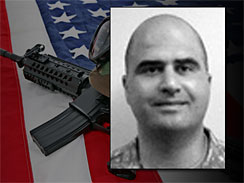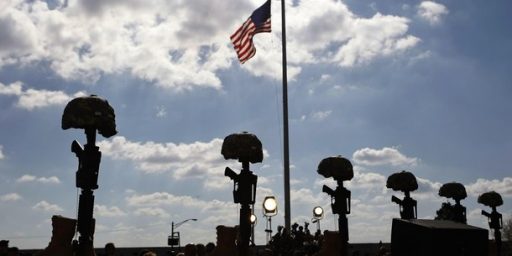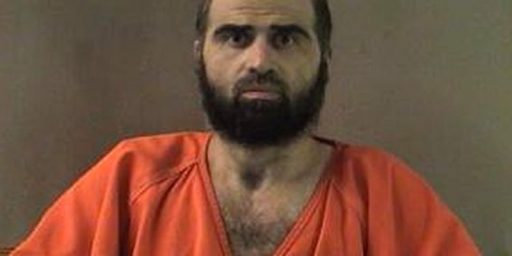Fort Hood Shooter Permitted To Represent Himself At Court Martial
As I suspected, a military judge has ruled that Major Nidal Hasan will be permitted to represent himself at his upcoming murder trial:
The Army psychiatrist accused of killing 13 people in a shooting rampage at Fort Hood, Tex., in 2009 will represent himself when his trial begins next month, the latest twist in a long-delayed case that is likely to raise numerous legal questions and could provide him with a stage to promote his radical Islamic beliefs, experts in military law said.
At a pretrial hearing at Fort Hood on Monday, the judge overseeing the court-martial of the psychiatrist, Maj. Nidal Malik Hasan, approved his request to release his court-appointed military lawyers and determined that he was physically and mentally capable of representing himself, Army officials said. Major Hasan was shot by the police at the time of the attack and is paralyzed below his chest.
The judge, Col. Tara A. Osborn, had ordered Major Hasan to undergo a physical examination because she questioned whether he was physically able to sit in the courtroom for hours at a time in his wheelchair and then work on his defense in his jail cell afterward. On Monday, the Army physician who conducted the exam and prepared a report for Colonel Osborn testified that Major Hasan could handle the physical strain.
Major Hasan has been charged with 13 counts of premeditated murder and 32 counts of attempted premeditated murder after the November 2009 shooting at Fort Hood in Killeen, Tex. He faces the death penalty if convicted.
It was unclear why Major Hasan released his Army legal team, and his objective in representing himself in a capital murder trial is unknown. He may cross-examine witnesses and even the shooting victims if they are called to testify for the prosecution, and there is also the possibility that he will interview prospective jurors when selection of the panel starts on Wednesday.
Experts in military law said Major Hasan could not do as effective a job defending himself as his lawyers have done. His lead lawyer, Lt. Col. Kris R. Poppe, helped him keep the beard that became a focus of his pretrial hearings and delayed the trial. Major Hasan said he grew his beard out of devotion to his faith, in violation of Army grooming regulations. The previous judge overseeing the case had ordered Major Hasan to be forcibly shaved, but a military appeals court removed the judge because of an appearance of bias and vacated the shaving order.
“One possibility is that he wants to use this trial as a platform, and he wants to make a spectacle of it,” said Geoffrey S. Corn, a former Army prosecutor and defense lawyer who is now a professor at the South Texas College of Law in Houston. “Let’s remember, this is a guy who has manifested his hatred for the institution that is trying him and defending him, the Army. I personally think that’s been the motive for the beard all along. It’s his one way to manifest his personal opposition to being in the Army. Maybe this is just part of that mentality.”
That’s what Zacharias Moussaui did when he represented himself on terrorism charges in Federal Court several years ago, so I wouldn’t be surprised to see Hasan follow the same route. Like Moussaui, it won’t really do him any good.





Will this trial be shown on HLN?
@Tyrell: No shite. I assume military law allows this and they’re stuck with it, but I feel sorry for the judge that’s going to have to try to manage this circus.
Fortunately, courts martial are not televised
@Doug Mataconis:
Does Hasan know that? What good is a spectacle without spectators?
Will it do him any bad? He’s going to be convicted and he will, at least, get life in prison without possibility of parole, and most likely, he’ll get executed. Does he want to avoid the death penalty? Would his lawyer have been able to accomplish that? If the answer to any of those is a no, then, what does he have to lose?